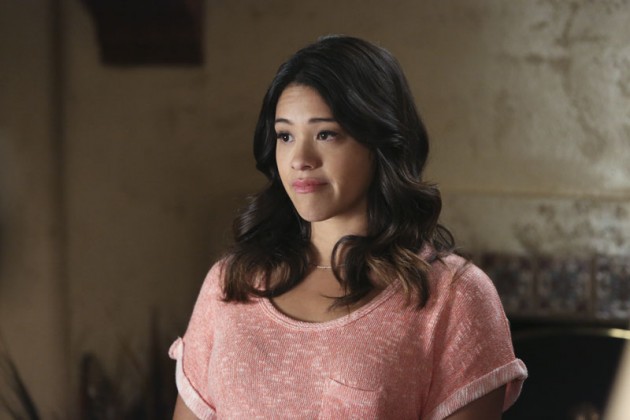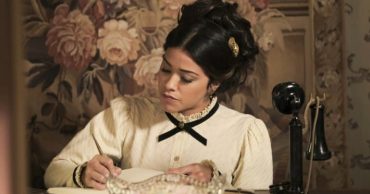
Gina Rodriguez earned the Golden Globe for Best Performance by an Actress in a Comedy. This was not only a phenomenal achievement for her, but a shining moment for The CW Network and for the Latino entertainment community. What do you think her win represents for one, or both, of these industries?
Araceli Aviles: I quite literally started screaming when Gina Rodriguez won. The CW has seen a massive overhaul in the variety and the quality of its shows in recent years, and the entertainment industry is finally paying attention. As a member of the Latin community, I take great personal pride in any accomplishment for my culture, which this definitely was. For too long, Latinos have either been the stereotypical bad guys, or been typecast as the sidekick or in guest roles. Jane the Virgin has created a platform for real genuine stories centered around this community to be told.
Laura Schinner: I was so incredibly happy to see Gina win the Golden Globe, not only because of her incredible portrayal of Jane, but for both those reasons as well. Her win represents that there is a place for Latinos in the entertainment industry and that people will embrace them and their culture. Everyone absolutely adores this cast, and rightfully so. With the cry for more diversity in television, this is another step forward for minorities and that is a fantastic thing. In terms of The CW, this is also a big win for them. Most awards shows follow the same pattern, handing over wins to the same shows and networks year after year. For The CW to be acknowledged in this way means a step away from that same old formula where only shows on NBC, CBS, FOX, or ABC can win. The door is open for other networks to prove that they too have quality programming, and hopefully, we continue to see them acknowledged for it.
Andy Behbakht: It tells us several things, one being how much The CW has changed since the amazing Mark Pedowitz took over The CW network. This accomplishment is also a message to everyone in this industry that your viewers and audience are interested in seeing stories told from not just the Caucasian community. We all have different skin colors, come from different backgrounds, and I think it’s important that we as a society learn about each other’s cultures and worlds, which is what I love so much about Jane the Virgin.
Chris King: Well, for The CW, Gina’s well-deserved win represented a shift in how the industry (and I hope viewers, as well) see the network. This was the first major award The CW had ever won, and it acted as a sign to the TV world that while the network may not have the biggest audiences tuning into its show, it’s creating some of the very best series on TV. More people should take The CW seriously.
With regard to the Latino entertainment community, I think Gina’s win illustrated a big step towards equality and acceptance. She’s playing the lead on this series, not a supporting character or a guest star, but the protagonist that we follow, which is not something that typically occurs; it’s not the norm. The fact that Jane the Virgin was made and that a character as well-written and fully realized as Jane exists is an achievement in its own right. And the positive reaction, from fans, critics, and now awards shows, just cements how special this series is and acts as a call for more equality, acceptance, and authentic representation of all different types of communities on television.
Jane the Virgin mixes drama, comedy, and romance well, but the show has also found ways to input social commentary. Subjects such as immigration, religion, and the socioeconomic gap have been prevalent on the show, but were never discussed in an overly negative way. How important do you think it is for the show to continue to input these messages into their narrative?
Araceli Aviles: There are many television shows that are entertaining, and this will always be the case. It’s the shows which dig deeper and tell stories that matter to people that leave lasting legacies. This is a particularly great challenge in a comedy, because if done in the wrong way, a good social commentary can become offensive. This show does a fantastic job of toeing the line between educational and going too far.
Laura Schinner: Jane the Virgin touches on so many topics that other shows are afraid to, in fear of alienating some of the audience. But these are topics that are important to our country right now and need to be addressed. The fact that they’re portrayed in a more positive way on Jane the Virgin is a great thing. The news often likes to report on only the bad side of the issues so many Americans don’t see the other side. Be it immigration, religion, or the socioeconomic gap, Jane the Virgin shows this other side, bringing light to ideas that viewers don’t see portrayed often on television. These characters represent real people, and just because they’re immigrants, or religious, or less well-off doesn’t mean they’re bad people. I think it’s incredibly important for the show to continue showing this, as they pave the way for a more open-minded America.
Andy Behbakht: I think the show should absolutely continue to do this type of social commentary as long as it’s organic and not unnaturally written into the episodes. Shows like Glee, which did a lot of social commentary as well, had cases when it felt a little too on the nose, but Jane the Virgin has so far not really done that. It’s good that we talk about very real life topics, but it has to feel that it’s not the main thing of the story.
Chris King: I think it’s incredibly important to showcase major issues like these in television, and Jane the Virgin is doing it in such a terrific way because the series isn’t taking any type of side. The show is telling this one specific story and bringing awareness to these topics without ever being preachy or offensive, adding a fresh and impressive new voice to the conversation. As long as Jane can continue presenting its social commentary this way in Season 2, I’m totally for it.
 Follow Us
Follow Us




